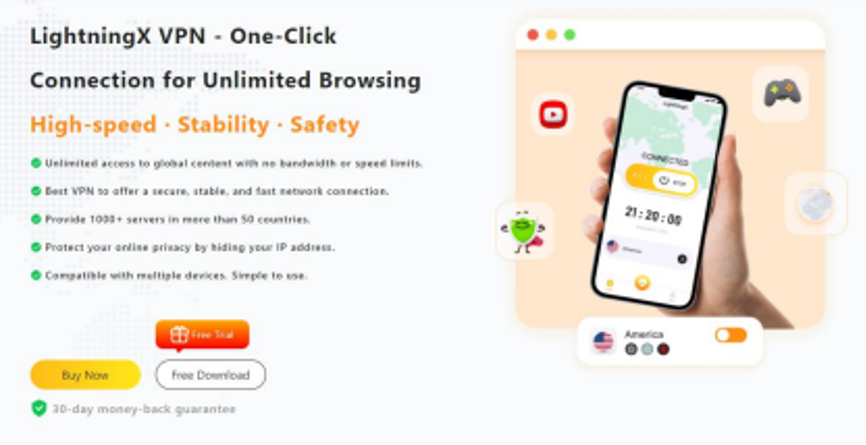If you’ve ever heard the term “proxy” and wondered what it means, you’re not alone. Many people come across this word when browsing the internet or trying to access websites that are restricted.
A proxy, in simple terms, acts like a middleman between you and the internet. It seems like what a VPN does. What’s the difference between a proxy and a VPN? LightningX VPN can tell the truth. Both a proxy and a VPN can change your IP address and bypass geo-restriction. However, what makes a VPN stand out is that it can provide an extra security layer. For example, LightningX VPN can encrypt all your accessed data by using encryption protocols like Shadowsocks and Bless. What’s more, it provides DNS leak protection, preventing your online activities from being tracked.
What Is a Proxy?
A proxy is a server or system that acts as an intermediary between your device (like your computer or phone) and the internet. When you use a proxy, your internet traffic is sent through the proxy server first, which then forwards it to the destination (like a website or app).
Imagine you want to visit a website, but you don’t want the website to know your identity or location. This is where a proxy comes in handy. When you use a proxy, you’re not directly connecting to the website. Instead, you’re asking the proxy server to connect for you.
This way, the website only sees the proxy’s information, not yours. It’s like sending someone to a store to buy something for you. The store doesn’t know who you are, only the person you sent.
Are Proxies and VPNs the Same?
You might be wondering if a proxy is the same as a VPN (Virtual Private Network). While both tools help protect your privacy and allow access to restricted content, they are different in some ways:
• VPNs encrypt all of your internet traffic, while most proxies only handle specific traffic like web browsing. As mentioned before, LightningX VPN uses encryption protocols likeWireGuard. In addition, it also employs strong encryption algorithms such as AES-256-GCM and ChaCha20-Poly1305. All these security features can ensure that your data will not be intercepted or decoded during transmission.
• VPNs provide more privacy and security, but some users believe it may cost more or slow down your connection. On the other hand, proxies can be faster, but they don’t offer the same level of protection.

You haven’t to worry about such issues when you use LightningX VPN.
Firstly, when it comes to privacy and security, it is the top-notch VPN highlighting on user’s data protection as described. Secondly, like its name, it provides lightning-like speed without any limit and makes your online activity stable. Finally, it supports a free trial and has a generous 30-day money-back guarantee. In a word, Lightningx VPN is one of the best VPNs for you!
So, if you need full privacy, a VPN might be the better choice. But if you just want to hide your location or bypass a simple website block, a proxy can be a simple option.
Why Do People Use Proxies?
There are several reasons why someone might want to use a proxy. Here are a fewof the most common reasons:
1. Privacy protection: Many people use proxies to hide their real identity online. This canbe useful if you’re concerned about websites tracking your location or other personal information.
2. Access to restricted content: Some websites and online services are only available in certain countries. For example, you might not be able to watch a specific video on YouTube because it’s blocked in your region. By using a proxy, you can pretend tobefrom a different country and access the content.
3. Improved security: A proxy can also add a layer of protection. When you connect to a proxy, your actual IP address (which is like your computer’s digital address) is hidden. This makes it harder for hackers or other malicious users to target you directly.
4. Better network performance: In some cases, using a proxy can speed up your internet connection. Some proxies cache copies of frequently visited websites, which means they can load them faster the next time you visit.
Different Types of Proxies
Not all proxies are the same. There are different types, each with its specific use. Let’s take a look at the most common ones:
1. HTTP Proxy: This type of proxy is used specifically for web traffic. It’s useful when you’re browsing the internet and want to hide your identity or access blocked websites. 2. HTTPS Proxy (SSL Proxy): Like an HTTP proxy, this one adds encryption for extra security. It’s commonly used for secure websites, such as online banking or shopping platforms.
3. SOCKS Proxy: A more flexible type of proxy, SOCKS works with more than just web traffic. It can handle different types of traffic, such as video streaming or file sharing. 4. Transparent Proxy: This proxy doesn’t hide your IP address. Websites will know that you’re using a proxy and can still see your real identity. It’s mainly used by businesses or schools to filter content or control network usage.
5. Anonymous Proxy: This type hides your IP address but still reveals that you’re using a proxy. It’s useful when you want some level of privacy but don’t mind that websites know you’re using a proxy.
Each type of proxy has specific uses, depending on what you need: privacy or access to restricted content.
How to Use a Proxy?
Using a proxy might sound complicated, but it’s quite simple. There are two main ways to use a proxy:
1. Manual setup: You can manually enter the proxy server’s details into your device or web browser settings. Many proxies will provide you with the information you need, such as the IP address of the proxy server and the port number.
2. Proxy software or services: Another way to use a proxy is by downloading special software or signing up for a service that handles everything for you. These services often come with easy-to-use apps that connect to the proxy automatically. You just need to click a button.
Are Proxies Legal?
One question that many people ask is, “Are proxies legal?” YES. Proxies are legal in most countries. However, it’s important to know that what you do while using a proxy still matters. For example, using a proxy to access copyrighted material without permission is illegal. Always make sure you’re following the rules of your country and the websites you visit.
Should You Use a Proxy?
Now that you know what a proxy is and how it works, you might be wondering if it’s right for you. If you’re looking for a simple way to protect your privacy, access restricted content, or improve your security, a proxy can be a great tool.
However, it’s not a one-size-fits-all solution. Depending on your needs, you might also want to consider using a VPN for more comprehensive protection.
Conclusion
A proxy is a useful tool that can help you in many different ways. Whether you’re trying to watch a blocked video, protect your privacy, or just browse the internet faster, a proxy could be just what you need. This post introduces what a proxy is, how it works, and the legality of a proxy. Hope this guide is what you need!
Lynn Martelli is an editor at Readability. She received her MFA in Creative Writing from Antioch University and has worked as an editor for over 10 years. Lynn has edited a wide variety of books, including fiction, non-fiction, memoirs, and more. In her free time, Lynn enjoys reading, writing, and spending time with her family and friends.


![What Is a Proxy [Simple for Beginners]](https://www.readability.com/wp-content/uploads/2024/11/What-Is-a-Proxy-Simple-for-Beginners-860x484.jpg)











